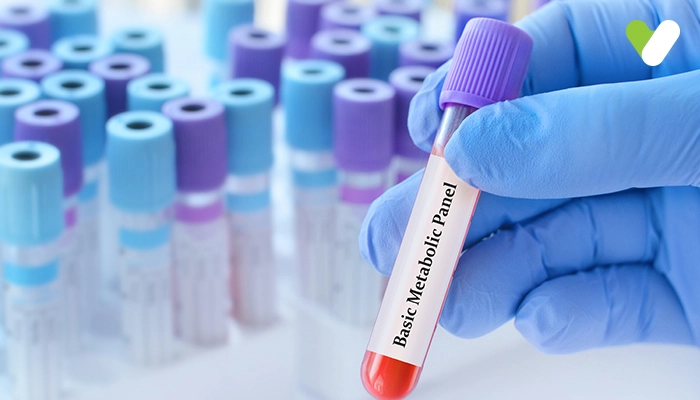A basic metabolic panel or BMP blood test is a type of test that weighs eight different substances in your bloodstream. This basic metabolic panel test embraces patients with imperative information about their body’s chemical balance and metabolism. Metabolism is a process where your body uses food and energy.

A BMP test comprises the following.
- Glucose: A type of sugar that is the prime source of energy.
- Calcium: An imperative mineral for your body. Calcium is a prerequisite for the proper functioning of your nerves, muscles, and heart.
- Sodium, Potassium, Carbon Dioxide, and Chloride: All these are electrolytes (electrically charged minerals) and are useful in controlling the amount of fluids and the equilibrium of acids and bases in your body.
- BUN (Blood Urea Nitrogen) and Creatinine: Waste products that are excreted from your blood by your kidneys.
Abnormal levels of these elements could be a sign of serious health problems.
The cost of the BMP test is Rs. 1500 to Rs.2000, depending on your location and place.
Please check the price of the BMP test in Delhi/NCR, your nearby centers and other details.
Test Summary
| Also known as | Chemistry Panel, Chemistry Screen, Chem 7, An Electrolyte Panel |
| Test Type | Blood |
| BMP test includes | To check the levels of eight substances in your body |
| Preparation | You may need to do fasting |
| Reporting | Within 24 hours |
| Test price | The cost of the BMP test is Rs. 1500 to Rs.2000, depending on your location and place. |
| Also included in | Health Insurance Plans |
| Related tests | Albumin, Bilirubin, ALT, AST |
Why do you need a BMP blood test?
Your healthcare provider may refer to this basic metabolic panel (BMP) test for several reasons. Your doctor may suggest this metabolic panel test get a wider assessment of your overall health. With eight individual measurements, this metabolic panel test checks various functions and processes, including- Your kidney function
- Your blood sugar levels
- The acid and base balance in your blood
- Your fluid and electrolyte balance
Your doctor may also suggest this test if you are experiencing some common symptoms like
- Fatigue
- Confusion
- Frequent vomiting
- Breathing difficulties
Your doctor may refer to this test for the following
- Diagnosis: A BMP test is beneficial in diagnosing certain medical conditions
- Screening: Screening implies an attempt to find various health issues before you are experiencing symptoms. Routine screening procedures are beneficial in finding out diseases in their early stages. Sometimes, your healthcare provider may recommend a BMP as a part of routine health checkups.
- Monitoring: If you are suffering from a healthcare condition, a BMP test will help your doctor determine whether your treatment is working or not. BMPs are also useful in checking the side effects of certain medications, especially those that can impact your kidneys.
The Test Preparation
You may need to fast for 8 hours before the test. Fasting means you can’t drink or eat anything other than water before your test.The Test Procedure
- A nurse or healthcare staff will check your arm to identify the vein.
- He will disinfect the area after the identification
- By inserting a small needle into your vein, he will collect your blood sample.
- The collected blood sample will be kept in a test tube.
- Once the test is over, the person will remove the needle and place a cotton ball or gauze on the site to prevent bleeding
- The whole process will be completed within five minutes
The Interpretation of the Result
If any one or a combination of BMP results were not normal, then this could indicate various health conditions.- Kidney disease
- Diabetes
- High Blood Pressure (Hypertension)
A BMP test will help in diagnosing acute health conditions, including
- Dehydration
- Diabetic ketoacidosis
- Hypoglycemia (low blood sugar)
- Kidney failure
If your BMP values are above the normal range, this doesn't necessarily imply that you are having a healthcare condition. Certain factors like diet, medications and medical conditions may affect your test results.


